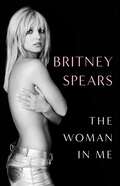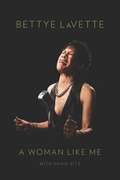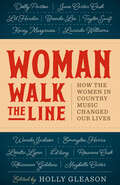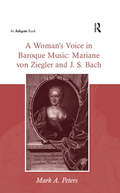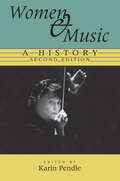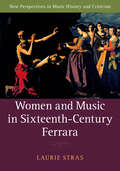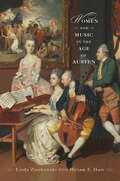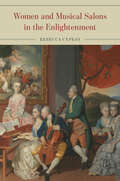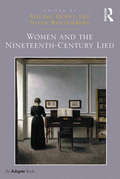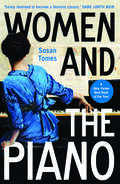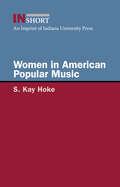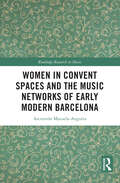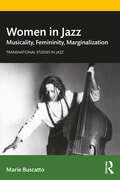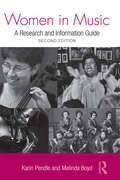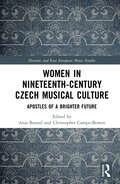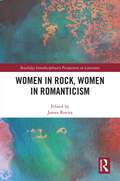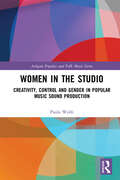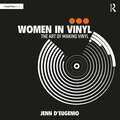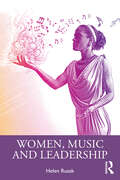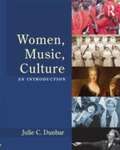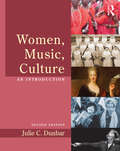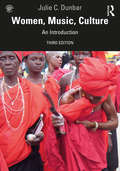- Table View
- List View
The Woman in Me
by Britney SpearsThe Woman in Me is a brave and astonishingly moving story about freedom, fame, motherhood, survival, faith, and hope. In June 2021, the whole world was listening as Britney Spears spoke in open court. The impact of sharing her voice—her truth—was undeniable, and it changed the course of her life and the lives of countless others. The Woman in Me reveals for the first time her incredible journey—and the strength at the core of one of the greatest performers in pop music history. Written with remarkable candor and humor, Spears&’s groundbreaking book illuminates the enduring power of music and love—and the importance of a woman telling her own story, on her own terms, at last.
A Woman Like Me
by David Ritz Bettye LavetteNow in paperback, "an un-inching and uncompromising look at a life lived across the tracks from fame . . " (Detroit Free Press) As a teenager in Detroit, Bettye LaVette scored a hit single with "My Man--He's a Lovin' Man." But by twenty, she had faded into obscurity, and bad luck repeatedly sabotaged her career. Then, after forty years of singing in clubs, her unforgettable performances at the 2008 Kennedy Center Honors and at President Obama's preinaugural concert put her back in the spotlight. A chronicle of LaVette's incredible life, A Woman Like Me is a poignant, brazen, take-no-prisoners memoir as thrilling and fearless as her music.
Woman Walk the Line: How the Women in Country Music Changed Our Lives (American Music Series)
by Holly GleasonIn this collection of personal essays, women music writers pay tribute to female country artists from June Carter Cash and Dolly Parton to Taylor Swift.Part history, part confessional, and part celebration of country music and the women who make it, Woman Walk the Line is an intimate collection of essays from some of America’s most intriguing women writers. It celebrates how these groundbreaking musicians have provided pivot points, important truths, and doses of courage for women at every stage of their lives. It explores the many ways in which music can transform not just the person making it, but also the listener.Rosanne Cash eulogizes June Carter Cash. A seventeen-year-old Taylor Swift considers the golden glimmer of another precocious superstar, Brenda Lee. The music of Patty Griffin is a balm for a post-9/11 survivor on the run. Emmylou Harris offers a gateway through paralyzing grief. And Lucinda Williams proves that greatness is where you find it.Elsewhere in this wide-ranging anthology, acclaimed historian Holly George Warren captures the spark of rockabilly sensation Wanda Jackson; Entertainment Weekly’s Madison Vain considers Loretta Lynn’s girl-power anthem “The Pill”; and rocker Grace Potter embraces Linda Ronstadt’s unabashed visual and musical influence.
Woman Walk the Line: How the Women in Country Music Changed Our Lives (American Music Series)
by Holly GleasonIn this collection of personal essays, women music writers pay tribute to female country artists from June Carter Cash and Dolly Parton to Taylor Swift.Part history, part confessional, and part celebration of country music and the women who make it, Woman Walk the Line is an intimate collection of essays from some of America’s most intriguing women writers. It celebrates how these groundbreaking musicians have provided pivot points, important truths, and doses of courage for women at every stage of their lives. It explores the many ways in which music can transform not just the person making it, but also the listener.Rosanne Cash eulogizes June Carter Cash. A seventeen-year-old Taylor Swift considers the golden glimmer of another precocious superstar, Brenda Lee. The music of Patty Griffin is a balm for a post-9/11 survivor on the run. Emmylou Harris offers a gateway through paralyzing grief. And Lucinda Williams proves that greatness is where you find it.Elsewhere in this wide-ranging anthology, acclaimed historian Holly George Warren captures the spark of rockabilly sensation Wanda Jackson; Entertainment Weekly’s Madison Vain considers Loretta Lynn’s girl-power anthem “The Pill”; and rocker Grace Potter embraces Linda Ronstadt’s unabashed visual and musical influence.
A Woman's Voice in Baroque Music: Mariane von Ziegler and J.S. Bach
by MarkA. PetersAt the end of his second year in Leipzig, J.S. Bach composed nine sacred cantatas to texts by Leipzig poet Mariane von Ziegler (1695-1760). Despite the fact that these cantatas are Bach's only compositions to texts by a female poet, the works have been largely ignored in the Bach literature. Ziegler was Germany's first female poet laureate, and the book highlights her significance in early eighteenth-century Germany and her commitment to advancing women's rights of self-expression. Peters enriches and enlivens the account with extracts from Ziegler's four published volumes of poetry and prose, and analyses her approach to cantata text composition by arguing that her distinctive conception of the cantata as a genre encouraged Bach's creative musical realizations. In considering Bach's settings of Ziegler's texts, Peters argues that Bach was here pursuing a number of compositional procedures not common in his other sacred cantatas, including experimentation with the order of movements within a cantata, with formal considerations in arias and recitatives, and with the use of instruments, as well as innovative approaches to Vox Christi texts and to texts dealing with speech and silence. A Woman's Voice in Baroque Music is the first book to deal in depth with issues of women in music in relation to Bach, and one of the few comprehensive studies of a specific repertory of Bach's sacred cantatas. It therefore provides a significant new perspective on both Ziegler as poet and cantata librettist and Bach as cantata composer.
Women and Music: A History
by Karin Anna PendleThis updated, expanded, and reorganized edition of Women and Music features even more women composers, performers, and patrons, even more musical contexts, and an expanded view of women in music outside Europe and North America. A popular university textbook, Women and Music is enlightening for scholars, a good source of programming ideas for performers, and a pleasure for other music lovers.
Women and Music in Sixteenth-Century Ferrara (New Perspectives in Music History and Criticism #28)
by Laurie StrasThe musica secreta or concerto delle dame of Duke Alfonso II d'Este, an ensemble of virtuoso female musicians that performed behind closed doors at the castello in Ferrara, is well-known to music history. Their story is often told by focussing on the Duke's obsessive patronage and the exclusivity of their music. This book examines the music-making of four generations of princesses, noblewomen and nuns in Ferrara, as performers, creators, and patrons from a new perspective. It rethinks the relationships between polyphony and song, sacred and secular, performer and composer, patron and musician, court and convent. With new archival evidence and analysis of music, people, and events over the course of the century, from the role of the princess nun musician, Leonora d'Este, to the fate of the musica secreta's jealously guarded repertoire, this radical approach will appeal to musicians and scholars alike.
Women and Music in the Age of Austen (Transits: Literature, Thought & Culture, 1650-1850)
by Pierre DuBois Kelly M. McDonald Danielle Grover Penelope Cave Simon Fleming Alison C. DeSimone Jane Girdham Leslie Ritchie Jeffrey A. Nigro Ruth Perry Devon R. Nelson Gayle Magee Juliette WellsWomen and Music in the Age of Austen highlights the central role women played in musical performance, composition, reception, and representation, and analyzes its formative and lasting effect on Georgian culture. This interdisciplinary collection of essays from musicology, literary studies, and gender studies challenges the conventional historical categories that marginalize women’s experience from Austen’s time. Contesting the distinctions between professional and amateur musicians, public and domestic sites of musical production, and performers and composers of music, the contributors reveal how women’s widespread involvement in the Georgian musical scene allowed for self-expression, artistic influence, and access to communities that transcended the boundaries of gender, class, and nationality. This volume’s breadth of focus advances our understanding of a period that witnessed a musical flourishing, much of it animated by female hands and voices. Published by Bucknell University Press. Distributed worldwide by Rutgers University Press.
Women and Musical Salons in the Enlightenment
by Rebecca CypessA study of musical salons in Europe and North America between 1760 and 1800 and the salon hostesses who shaped their musical worlds. In eighteenth-century Europe and America, musical salons—and the women who hosted and made music in them—played a crucial role in shaping their cultural environments. Musical salons served as a testing ground for new styles, genres, and aesthetic ideals, and they acted as a mediating force, bringing together professional musicians and their audiences of patrons, listeners, and performers. For the salonnière, the musical salon offered a space between the public and private spheres that allowed her to exercise cultural agency. In this book, musicologist and historical keyboardist Rebecca Cypess offers a broad overview of musical salons between 1760 and 1800, placing the figure of the salonnière at its center. Cypess then presents a series of in-depth case studies that meet the salonnière on her own terms. Women such as Anne-Louise Brillon de Jouy in Paris, Marianna Martines in Vienna, Sara Levy in Berlin, Angelica Kauffman in Rome, and Elizabeth Graeme in Philadelphia come to life in multidimensional ways. Crucially, Cypess uses performance as a tool for research, and her interpretations draw on her experience with the instruments and performance practices used in eighteenth-century salons. In this accessible, interdisciplinary book, Cypess explores women’s agency and authorship, reason and sentiment, and the roles of performing, collecting, listening, and conversing in the formation of eighteenth-century musical life.
Women and Musical Salons in the Enlightenment
by Rebecca CypessA study of musical salons in Europe and North America between 1760 and 1800 and the salon hostesses who shaped their musical worlds. In eighteenth-century Europe and America, musical salons—and the women who hosted and made music in them—played a crucial role in shaping their cultural environments. Musical salons served as a testing ground for new styles, genres, and aesthetic ideals, and they acted as a mediating force, bringing together professional musicians and their audiences of patrons, listeners, and performers. For the salonnière, the musical salon offered a space between the public and private spheres that allowed her to exercise cultural agency. In this book, musicologist and historical keyboardist Rebecca Cypess offers a broad overview of musical salons between 1760 and 1800, placing the figure of the salonnière at its center. Cypess then presents a series of in-depth case studies that meet the salonnière on her own terms. Women such as Anne-Louise Brillon de Jouy in Paris, Marianna Martines in Vienna, Sara Levy in Berlin, Angelica Kauffman in Rome, and Elizabeth Graeme in Philadelphia come to life in multidimensional ways. Crucially, Cypess uses performance as a tool for research, and her interpretations draw on her experience with the instruments and performance practices used in eighteenth-century salons. In this accessible, interdisciplinary book, Cypess explores women’s agency and authorship, reason and sentiment, and the roles of performing, collecting, listening, and conversing in the formation of eighteenth-century musical life.
Women and the Nineteenth-Century Lied
by Aisling Kenny Susan WollenbergThis book bridges a gap in existing scholarship by foregrounding the contribution of women to the nineteenth-century Lied. Building on the pioneering work of scholars in recent years, it consolidates recent research on women’s achievements in the genre, and develops an alternative narrative of the Lied that embraces an understanding of the contributions of women, and of the contexts of their engagement with German song and related genres. Lieder composers including Fanny Hensel, Clara Schumann, Pauline Viardot-Garcia and Josephine Lang are considered with a stimulating variety of analytical approaches. In addition to the focus on composers associated with history and theory of the Lied, the various chapters explore the cultural and sociological background to the Lied’s musical environment, as well as engaging with gender studies and discussing performance and pedagogical contexts. The range of subject matter reflects the interdisciplinary nature of current research in the field, and the energy it generates among scholars and performers. Women and the Nineteenth-Century Lied aims to widen readers’ perception of the genre and help promote awareness of women’s contribution to nineteenth-century musical life through critical appraisal of the cultural context of the Lied, encouraging acquaintance with the voices of women composers, and the variety of their contributions to the repertoire.
Women and the Piano: A History in 50 Lives
by Susan TomesWomen are an essential part of the history of the piano—but how many women pianists can you name? Throughout most of the piano’s history, women pianists lacked access to formal training and were excluded from male-dominated performance spaces. Even the modern piano’s keys were designed without consideration of women’s typically smaller hands. Yet despite their music being largely confined to the domestic sphere, women continued to play, perform, and compose on their own terms. Celebrated pianist and author Susan Tomes traces fifty such women across the piano’s history. Including now-famous names such as Clara Schumann and Fanny Mendelssohn, Tomes also highlights overlooked women: from Hélène de Montgeroult, whose playing saved her life during the French Revolution, to Leopoldine Wittgenstein, influential Viennese salonnière, and Hazel Scott, the first Black performer in the United States to have a nationally syndicated TV show. From Maria Szymanowska to Nina Simone, and including interviews with women performing today, this is a much-needed corrective to our understanding of the piano—and a timely testament to women’s musical lives.
Women in American Popular Music
by S. Kay HokeA concise collection exploring women in rock, rap, folk, and other contemporary genres.Women in American Popular Music features composers, performers, patrons, musical contexts, and an expanded view of women in music in America.Touching on genres such as Tin Pan Alley, rock, rap, country, gospel, and soul, this enlightening collection is a good source of programming ideas for performers and a handy resource for music lovers.
Women in Convent Spaces and the Music Networks of Early Modern Barcelona (Routledge Research in Music)
by Ascensión Mazuela-AnguitaThis book presents the first study of music in convent life in a single Hispanic city, Barcelona, during the early modern era. Exploring how convents were involved in the musical networks operating in sixteenth-century Barcelona, it challenges the invisibility of women in music history and reveals the intrinsic role played by nuns and lay women in the city’s urban musical culture. Drawing on a wide range of archival sources, this innovative study offers a cross-disciplinary approach that not only reveals details of the rich musical life in Barcelona’s nunneries, but shows how they took part in wider national and transnational networks of musical distribution, including religious, commercial, and social dimensions of music. The connections of Barcelona convents to networks for the dissemination of music in and outside the city provide a rich example of the close relationship between musical networks, urban society, and popular culture. Addressing how music was understood as a marker of identity, prestige, and social status and, above all, as a conduit between earth and heaven, this book provides new insights into how women shaped musical traditions in the urban context. It is essential reading for scholars of early modern history, musicology, history of religion, and gender studies, as well as all those with an interest in urban history and the city of Barcelona. The book is supported by additional digital appendices, which include: Records of inquiries into the lineage of Santa Maria de Jonqueres nuns Development of the collections of choir books belonging to the convents of Santa Maria de Jonqueres and Sant Antoni i Santa Clara
Women in Jazz: Musicality, Femininity, Marginalization
by Marie BuscattoWomen in Jazz: Musicality, Femininity, Marginalization examines the invisible discrimination against female musicians in the French jazz world and the ways in which women thrive as professionals despite such conditions. The author shines a light on the paradox for women in jazz: to express oneself in a "feminine" way is to be denigrated for it, yet to behave in a "masculine" manner is to be devalued for a lack of femininity. This masculine world ensures it is more difficult for women to be recognized as jazz musicians than it is for men – even when musicians, critics and audiences are ideologically opposed to discrimination. Female singers are confined by the feminine stereotypes of their profession, while female instrumentalists must comport themselves into traditionally masculine roles. The author explores the academic and professional socializations of these musicians, the musical choice they make and how they are perceived by jazz professionals as a result. First published in French by CNRS Editions in 2007 (and later reissued in paperback in 2018, with the author’s postscript that "nothing much has changed"), Women in Jazz: Musicality, Femininity, Marginalization expands the conversation beyond the French border, identifying female jazz musicians as a discriminated minority all around the world.
Women in Music: A Research and Information Guide (Routledge Music Bibliographies)
by Karin Pendle Melinda BoydWomen in Music: A Research and Information Guide is an annotated bibliography emerging from more than twenty-five years of feminist scholarship on music. This book testifies to the great variety of subjects and approaches represented in over two decades of published writings on women, their work, and the important roles that feminist outlooks have played in formerly male-oriented academic scholarship or journalistic musings on women and music.
Women in Nineteenth-Century Czech Musical Culture: Apostles of a Brighter Future (Slavonic and East European Music Studies)
by Anja Bunzel Christopher Campo-BowenThis volume focuses on the circumstances of women’s music-making in the vibrant and diverse environment of the Czech lands during the nineteenth century. It sheds light on little-known women musicians, while also considering more well-known works and composers from new woman-centric perspectives. It shows how the unique environment of Habsburg Central Europe, especially Bohemia and Lower Austria, intersects with gender to reveal hitherto unexplored networks that challenge the methodological nationalism of music studies as well as the discipline’s continued emphasis on singular canonical figures. The main areas of enquiry address aspects of performance and identity both within the Czech lands and abroad; women’s impact on social life with a view to different private, semiprivate, and public contexts and networks; and compositional aesthetics in musical works by and about women, analysed through the lens of piano works, song, choir music, and opera, always with the reception of these works in mind.
Women in Rock, Women in Romanticism (Routledge Interdisciplinary Perspectives on Literature)
by Rovira JamesWomen in Rock, Women in Romanticism is the first book-length work to explore the interrelationships between contemporary female musicians and eighteenth- and nineteenth-century art, music, and literature by women and men. The music and videos of contemporary musicians including Erykah Badu, Beyoncé, The Carters, Hélène Cixous, Missy Elliot, the Indigo Girls, Janet Jackson, Janis Joplin (and Big Brother and the Holding Company), Natalie Merchant, Joni Mitchell, Janelle Monáe, Alanis Morrisette, Siouxsie Sioux, Patti Smith, St. Vincent (Annie Clark), and Alice Walker are explored through the lenses of pastoral and Afropresentism, Gothic, female Gothic, and the literature of William Blake, Beethoven, Arthur Schopenhauer, Samuel Taylor Coleridge, Charlotte Dacre, Ralph Waldo Emerson, E.T.A. Hoffmann, Ann Radcliffe, William Shakespeare, Mary Shelley, her husband Percy Shelley, Henry David Thoreau, Horace Walpole, Jane Williams, Mary Wollstonecraft, and William Wordsworth to explore how each sheds light on the other, and how women have appropriated, responded to, and been inspired by the work of authors from previous centuries.
Women in Texas Music
by Kathleen HudsonAcross the state and across a wide variety of musical genres, women are making their mark on Texas music. Some have become international superstars, while others are just starting to make their voices heard. But every woman who goes out and plays her music proves that "baring one's heart and soul takes courage, and Texas women artists have a lot of courage," as Lloyd Maines observes in the opening interview of this book. To pay tribute to these dedicated musicians and to capture their unique perspectives on what it means to be a woman in the music business, Kathleen Hudson has spent many years interviewing Texas women musicians for the Texas Heritage Music Foundation. In Women in Texas Music, Hudson lets us listen in on conversations with thirty-nine musical artists, including Emily Robison, Terri Hendrix, Lee Ann Womack, Rosie Flores, Betty Buckley, Marcia Ball, Lavelle White, and Bobbie Nelson. Hudson encourages and allows the women to tell their own stories as she delves into their life journeys, creative processes, and the importance of writing and performing music, be it blues, rock, country, folk, jazz, or pop. The interviews are warm and open, like good friends sharing the lessons that a life of playing music has taught them. What emerges from this collection is a solid sense of the strength and integrity that women bring to and gain from Texas music. Everyone who cares about music and culture in Texas will want to join the conversation.
Women in the Studio: Creativity, Control and Gender in Popular Music Sound Production (Ashgate Popular and Folk Music Series)
by Paula WolfeThe field of popular music production is overwhelmingly male dominated. Here, Paula Wolfe discusses gendered notions of creativity and examines the significant under-representation of women in studio production. Wolfe brings an invaluable perspective as both a working artist-producer and as a scholar, thereby offering a new body of research based on interviews and first-hand observation. Wolfe demonstrates that patriarchal frameworks continue to form the backbone of the music industry establishment but that women’s work in the creation and control of sound presents a potent challenge to gender stereotyping, marginalisation and containment of women’s achievements that is still in evidence in music marketing practices and media representation in the digital era.
Women in Vinyl: The Art of Making Vinyl
by Jenn D’EugenioWomen in Vinyl: The Art of Making Vinyl provides a comprehensive guide to the world of vinyl, with a focus on empowerment, diversity, and inclusion, designed to both demystify the vinyl community and highlight the vital role women and minority groups play in shaping the industry.Divided into each step of the process, the book provides a detailed overview of the vinyl manufacturing process, from lacquer cutting, electroplating, and record pressing, to the roles of record labels, distribution, DJs, and more. With interviews and profiles from global professionals throughout, the book is a first-of-its-kind guide to the vinyl industry and the women who are blazing trails within it. Women in Vinyl is an essential resource for professionals, hobbyists, and students interested in the process of making vinyl, including those who want to deepen their understanding of the vinyl medium and its role in shaping the music industry, as well as for those interested in the work of the organization Women in Vinyl.
Women, Music and Leadership
by Helen RusakWomen, Music and Leadership offers a wide-ranging survey of women in musical leadership and their experiences, highlighting women’s achievements and considering how they negotiate the challenges of the leadership space in music. Women have always participated in music as performers, teachers, composers and professionals, but remain underrepresented in leadership positions. Covering women’s leadership across a wide variety of roles and musical genres, this book addresses women in classical music, gospel, blues, jazz, popular music, electronic music and non-Western musical contexts, and considers women working as composers, as conductors, and in music management and the music business. Each chapter includes several case studies of women’s careers, exploring their groundbreaking contributions to music and the challenges they faced as leaders. Connecting management theory and leadership research with feminist musicology, this book paints a new picture of women’s major contributions as leaders in music and their ongoing struggles for equity. It will be relevant to students and scholars in arts and music management, as well as all those studying music, gender or leadership, and women music professionals.
Women, Music, Culture: An Introduction
by Julie C. DunbarWomen, Music, Culture is an undergraduate textbook on the history and contribution of women in a variety of musical genres and professions. Clear writing, compelling narrative, and more than fifty guided listening examples bring the world of women in music to life. It includes a wide array of pedagogical aids, including an abundance of photographs, a comprehensive companion website, critical thinking exercises, as well as a running glossary that reinforces key figures and terms. Covering important figures in art music and popular music, it examines a community of women involved in the world of music, including composers, producers, consumers, performers, technicians, mothers, educators and listeners.
Women, Music, Culture: An Introduction
by Julie C. DunbarWomen, Music, Culture: An Introduction, Second Edition is the first undergraduate textbook on the history and contribution of women in a variety of musical genres and professions, ideal for students in courses in both music and women's studies. A compelling narrative, accompanied by over 50 guided listening examples, brings the world of women in music to life, examining a community of female musicians, including composers, producers, consumers, performers, technicians, mothers, and educators in art music and popular music. The book features a wide array of pedagogical aids, including a running glossary and a comprehensive companion website with streamed audio tracks, that help to reinforce key figures and terms. This new edition includes a major revision of the Women in World Music chapter, a new chapter in Western Classical "Work" in the Enlightenment, and a revised chapter on 19th Century Romanticism: Parlor Songs to Opera. 20th Century Art Music.
Women, Music, Culture: An Introduction
by Julie C. DunbarWomen, Music, Culture: An Introduction, Third Edition is the first undergraduate textbook on the history and contributions of women in a variety of musical genres and professions, ideal for students in Music and Gender Studies courses. A compelling narrative, accompanied by 112 guided listening experiences, brings the world of women in music to life. The author employs a wide array of pedagogical aides, including a running glossary and a comprehensive companion website with links to Spotify playlists and supplementary videos for each chapter. The musical work of women throughout history—including that of composers, performers, conductors, technicians, and music industry personnel—is presented using both art music and popular music examples. New to this edition: An expansion from 57 to 112 listening examples conveniently available on Spotify. Additional focus on intersectionality in art and popular music. A new segment on Music and #MeToo and increased coverage of protest music. Additional coverage of global music. Substantial updates in popular music. Updated companion website materials designed to engage all learners.
